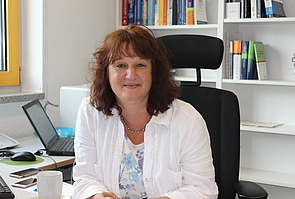1. What exciting topics are you currently working on?
We are currently trying to set up a national database for patients detained in forensic-psychiatric settings. It is rather disconcerting that there is no such database in Germany already. Therefore, there is almost no information on a national level regarding which patients are detained in forensic-psychiatric settings, their diagnoses, offending, treatment, length of stay and outcomes. Given the very resource intensive treatment and the very restrictive conditions in forensic-psychiatric settings, it is crucial that such a database exists to inform further developments in the field.
2. How would you summarise your career path?
A bit convoluted … but I always tried to go to where I thought I could learn the most and later where I could have the most impact. I have always combined clinical and research work and there is a strong international element to my career from very early on as I think it is very important to look beyond one’s own nose (apart from my love for travel). I had clinical placements in Namibia and the US, later I was involved in projects in Iraq, Sri Lanka, Egypt, etc. I trained in Switzerland, Germany and the UK. In fact, I spent nearly 20 years in the UK before returning to Germany in 2018.
3. Where do your best ideas emerge from?
I don’t jog or listen to music (some of the most frequent answers to such questions), so for me it is definitely the exchange with others. To the horror of those around me, I always come back from conferences with 100+ new ideas.
4. Who or what had or has had the strongest positive influence on your career and work?
As a person this has to be Prof Pamela Taylor who was one of my first supervisors and later mentor in my psychiatric training. She was an example in how to combine a clinical and research career and how the two aspects can cross-fertilize. She always took time to listen to patients and staff alike, including the most junior ones, and took mentoring of young colleagues very seriously.
Generally, being in the UK for most of my career has had a strong influence on me, particularly the emphasis on evidence based practice and quality of care, but also the humbleness of people, their sense of fairness and focus on common goals rather than personal gains.
5. What do you consider the greatest challenge or hurdle for progress in your field?
Data protection, data protection, data protection…
Also restrictions on research in forensic psychiatry, e. g. the prohibition of drug trials in forensic settings. While the history and purpose are clear, I think it is discriminating and patronizing. We need to take informed consent very seriously and let the patients decide themselves whether they want to take part in research or not.
A challenge shared with other medical specialties is the relative lack of research training in medical school and the insufficient integration of research into practice beyond academic centers.
6. What are, in your opinion, the opportunities, directions or decisions that are vital to progress neurosciences?
In terms of methodology, it will probably be AI and big datasets. In terms of research strategy, the most meaningful progress in my view will come from integrating clinical and research careers and direct funding accordingly. Measuring impact should not just be about publication metrics but clinical impact and change in practice.
7. Tell us what would have to happen in your work for you to say “A dream has come true!”?
My dream is to act as an advisor for setting up forensic psychiatric services from scratch in a country that doesn’t currently have such provision. I came very close to this recently but the bid (which would have involved a project in Albania) was not supported by the EU in the end.
8. What was your greatest experience as a scientist?
Generally working as part of great teams, e. g. in Prof Cowen’s lab in Oxford.
9. What has been your biggest scientific failure so far, and how do you deal with failed experiments and defeats?
I can’t remember many big failures (which may be part of how I deal with these…) but definitely learning from mistakes is an important part of everyday life. One mishap I remember – now with a smile – is a situation in the lab in Oxford. I stood with a PhD student in the very cold freezer room, fishing for vials with plasma samples of a study measuring 5-HT response to various substances compared to placebo. Due to a labelling error it was not possible to correctly identify the research participants and the whole study of a year was wasted. Very close supervision of all steps, even the most obvious ones, is very important is what I learned from that…
10. With which historical person, politician or celebrity would you like to have a dinner and discuss your work?
Albert Schweitzer for his humanity which stretched beyond humankind.
Prof. Dr. med. Birgit Völlm PhD MRCPsych DiplForPsych
Klinik und Poliklinik für Forensische Psychiatrie
Universitätsmedizin Rostock

